- Kalaripayattu, the vibrant traditional martial art of Kerala, has been a part of the history and culture of Kerala from time immemorial. It is in Kerala that even today this art form retains all its intrinsic qualities unaltered. Kalaripayattu is considered as the ‘Mother of all Martial Arts’, its offshoots being martial art forms like Karate, Kun-Fu. Tai Chi, Silambam etc. Kalaripayattu thus forms a holistic base for the many of today’s performing artists.
- Kalaripayattu is said to be one of the oldest traditional art coming down in the form of Guru-Sisya parampara (Teacher – Student lineage).
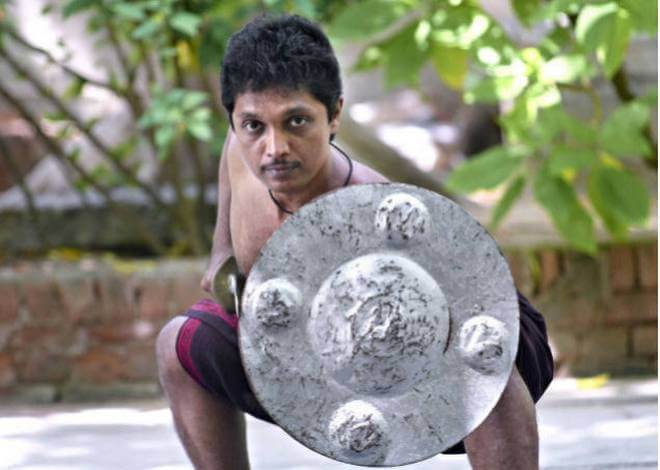
Shaji K John, a professional Kalaripayattu instructor, is a student of Shri E P Vasudevan Gurukkal, Kerala. Trained in the traditional Kalaripayattu of the northern style for nearly 10 years, Shaji joined the Contemporary Dancer-Choreographer Chandralekha under the instruction of Gurukkal. Shaji won the District Championship during the years 1986 to 1991 and the State Championship during the years 1988 to 1989 in Kerala.
Shaji has performed in major productions of Chandralekha since 1986. He has traveled extensively the world over, including US, Japan, Singapore, London, Indonesia, Hong Kong, Taiwan, Canada, Denmark, Germany, Russia, Brazil, Austria, Holland, France, Germany, Reunion, etc and has also conducted Kalaripayattu interactive workshops as part of international cultural exchange programme. Shaji is a recipient of Theater Communications Group International Fellowship and is an artist in residence with Pangea World Theater, Minneapolis, U.S.
Shaji started regular Kalaripayattu classes in Chennai in 1998 and since then has been conducting regular classes in various parts of Chennai. The Kalari massage Chikilsa, a part of Kalaripayattu, is used for various treatment combined with Ayurvedic medicines. Shaji treats people with such ailments.
Shaji conducts regular classes in various parts of Chennai. He has integrated the nuances of martial movements, yoga and exercises to suit the requirements of people in the city. The classes begin with breathing exercises, warm-up exercises, meithari and kolthari. Yoga asanas are practiced to enhance flexibility and body control. Shaji over the past ten years of teaching Kalari in Chennai has modified the teaching methodology with a blend of traditional practices and modern life requirements.
- The place of martial art training is known as ‘Kalari’ and the practice of this martial art is ‘Payattu’.
- The Kalari traditionally serves the functions of both a training centre and a temple.
- Kalaripayattu originates not in aggression but in the disciplining of the self. Therefore the training begins with disciplining the physical body and attaining a mental balance.
- This is crucial for any person and not necessarily a martial aspirant. This first stage of training consists of physical exercises to develop strength, flexibility, balance and stamina.
- It includes jumps, low stances on the floor, circular sequences, kicks etc. An attempt is made to understand and master each separate organ of the body.
- These exercises bring an alertness to the mind, and this alertness helps one understand some of the movements and processes of the self defence sequences that are taught at later stages.
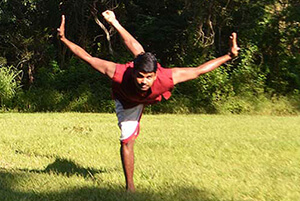
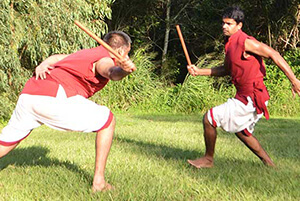
- This is the second level of training wherein the wooden weapons are introduced. One may wonder, in this age of fast growing technology do such practices help? The purpose of weapons training is to remove fear – training allows one to “see", and not run away.
- It is believed that all forms of fear can be reduced to two basic types – visual and aural.
- The correct weapon training helps to develop dristi sthirata – seeing clearly with stability – which prevents the mind from panicking, thus allowing one to calmly assess the situation and take appropriate action.
- The weapon wielding techniques may not be applied directly but it plays a major role in building confidence, alertness and balance of the body. An alert person is free from stress and anxiety.
- If the student masters the first two stages of training, one need not continue the learning of the art as the first two stages moulds the personality and enables one to face situations in life better.
- The first two stages in that point of view becomes a necessity to all.
- Further training is provided to those students who aspire to learn the martial aspect. Here the metal weapon training is introduced.
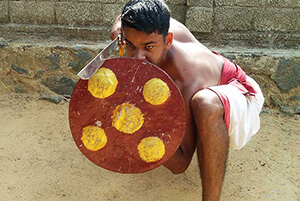
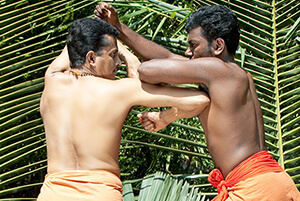
- The bare-hand techniques of locking, gripping, throwing and further blocking, striking and kicking techniques are taught.
- This part of the study includes knowing the vital points or nerve centre striking.
- This is said to be the advanced stage and a Kalari Gurukkal (the title given to the Preceptor of Kalaripayattu) of the Martial traditional order will impart this knowledge only to those students who are highly disciplined not only in Kalari but also in their daily life.
- The student also learns the Marma Chikilsa as part of Kalari’s advanced study.
- It is a method of treatment to cure the defects affected on the marmas (vital points) of the human body.
- A Kalari Gurukkal can detect the damaged marmas that could be the result of some injury in the past.
- Damages to marmas lead to illness, chronic conditions or emotional insecurity for which the Gurukkal has the treatment.